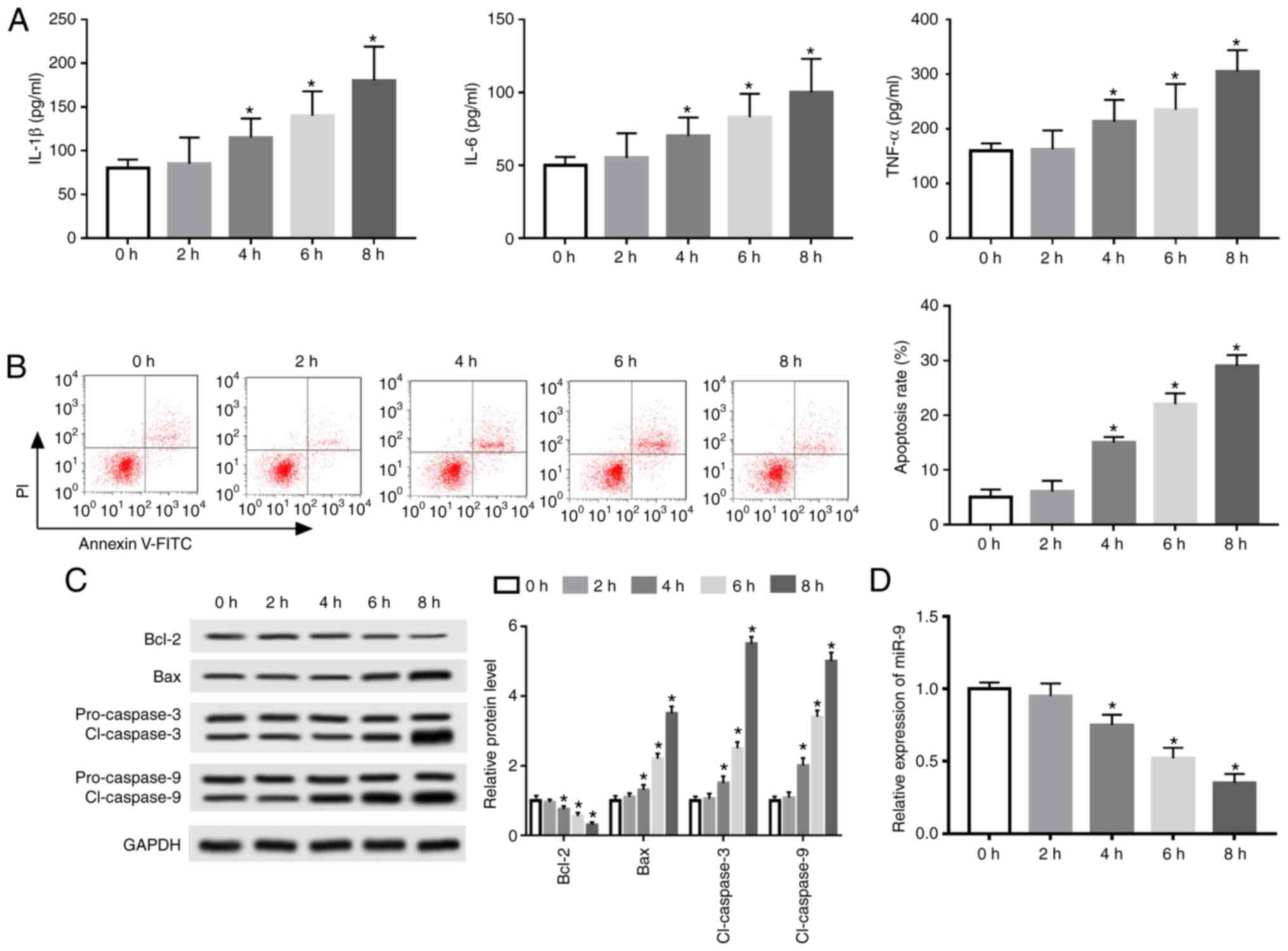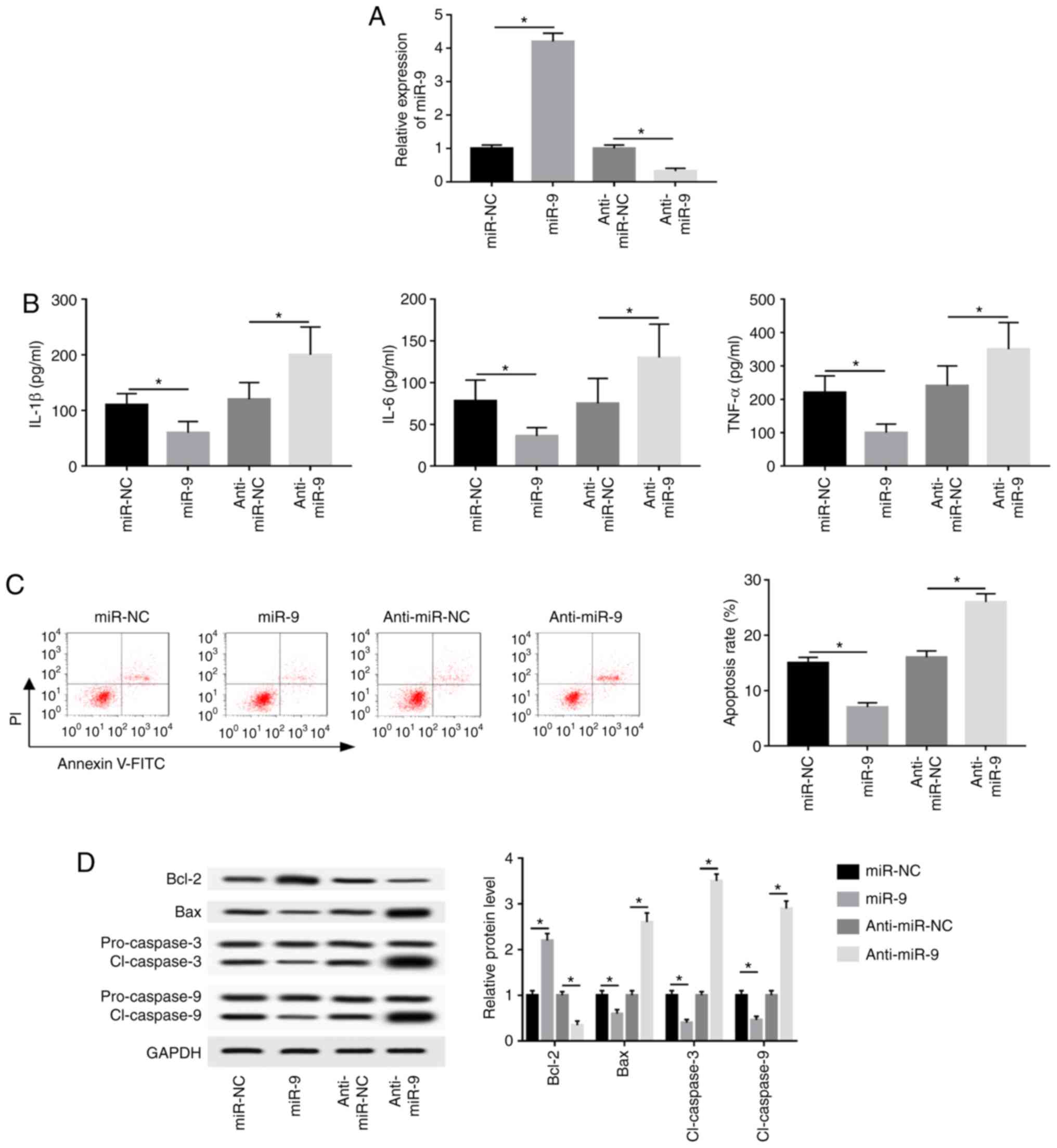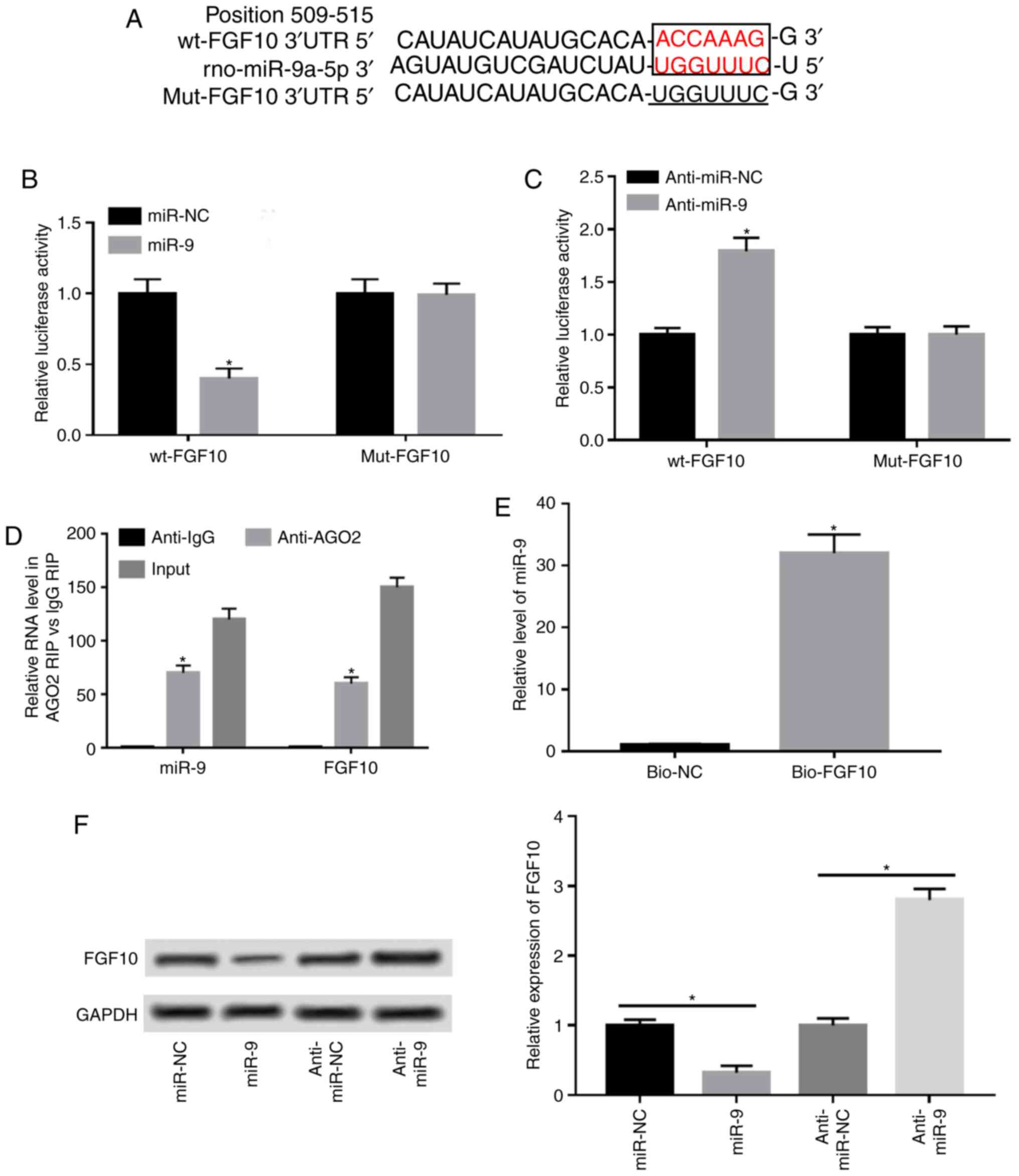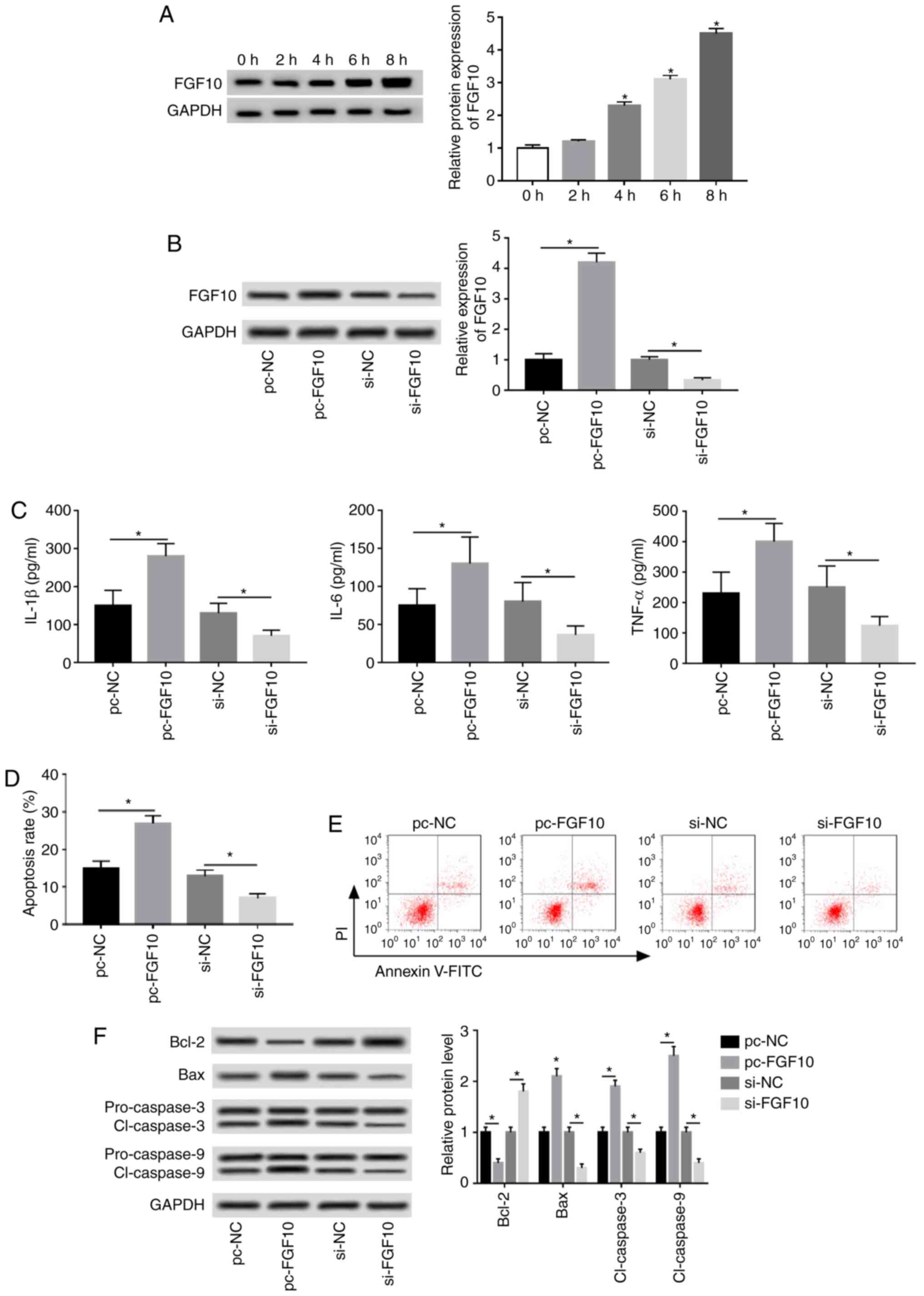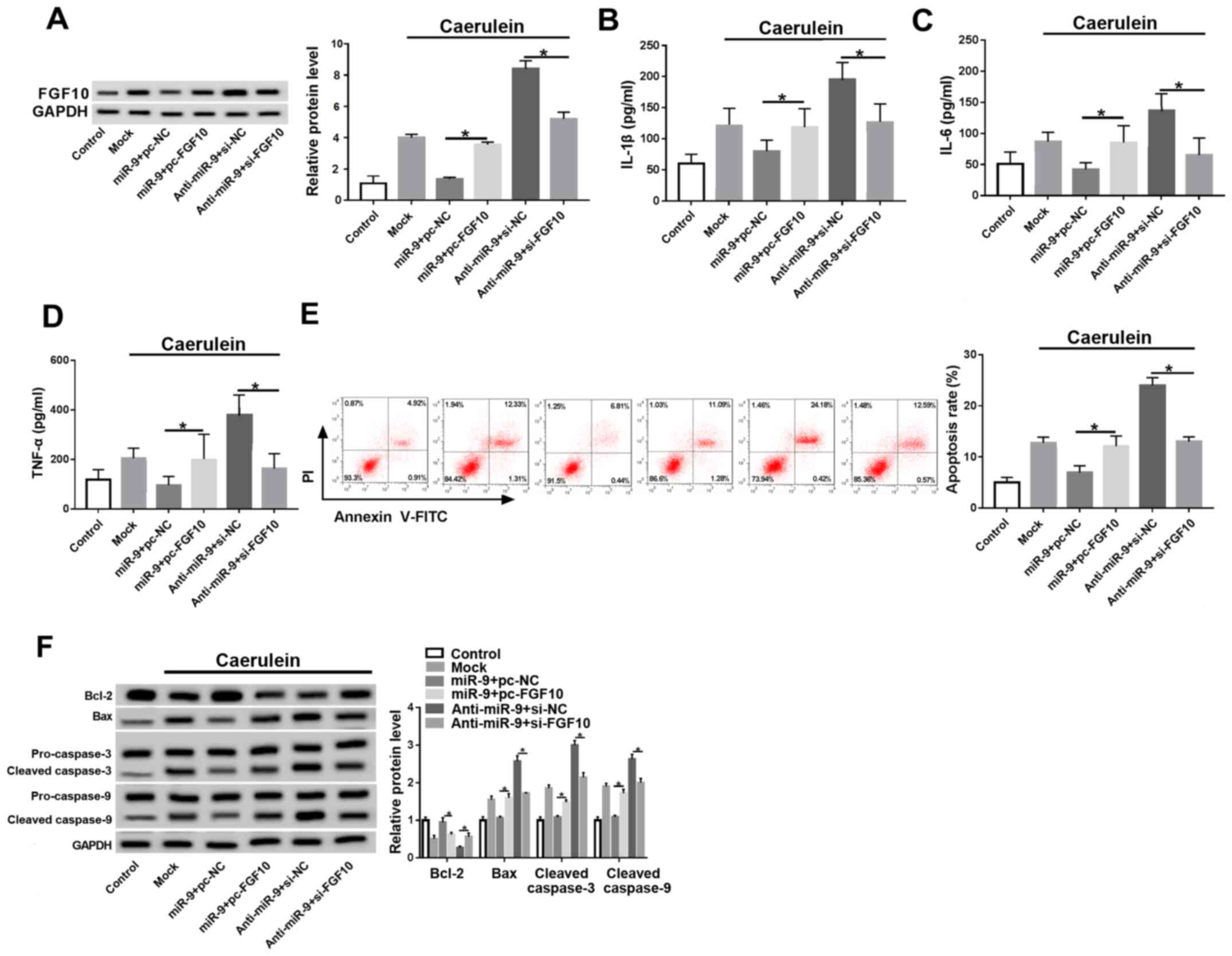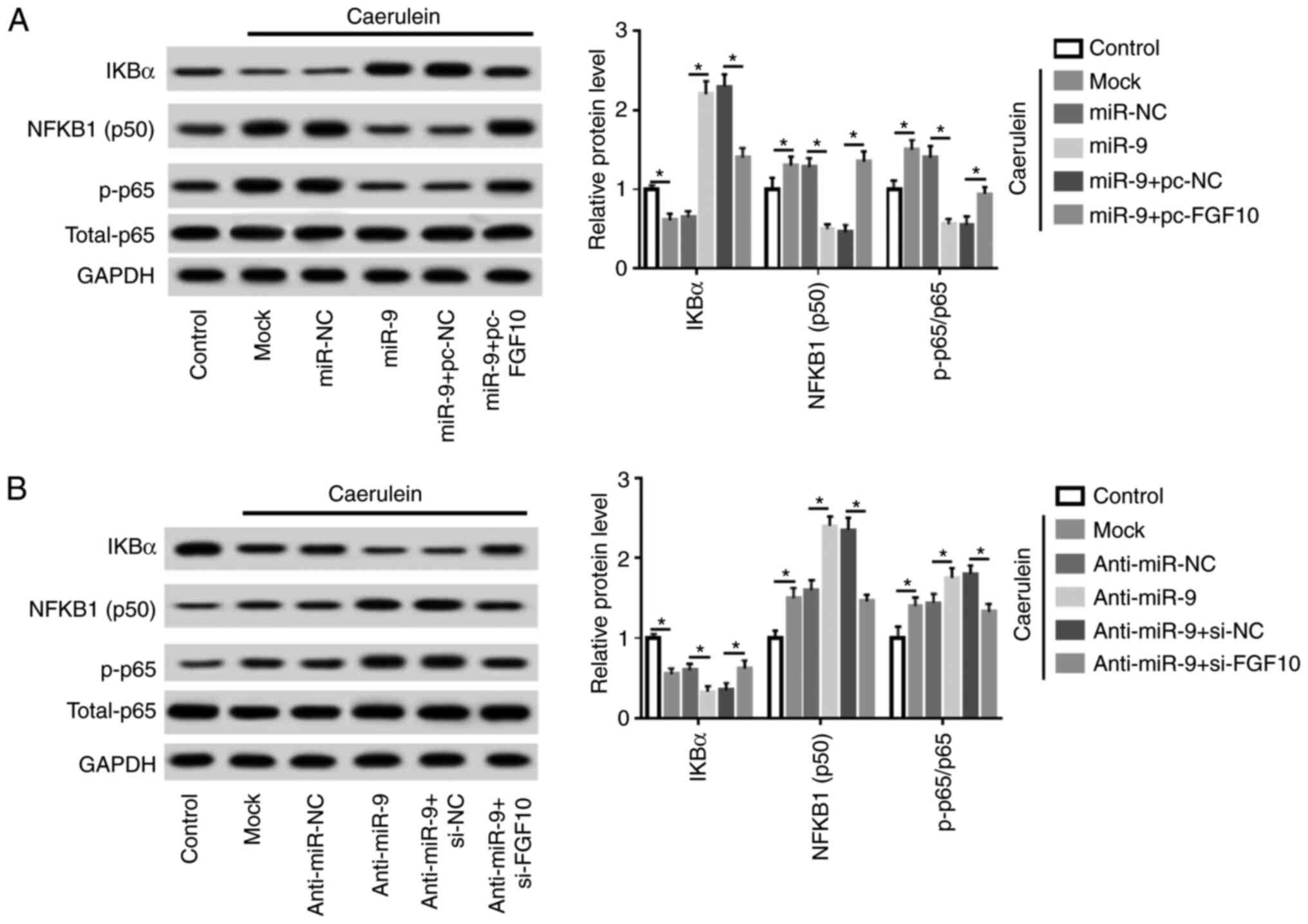|
1
|
Forsmark CE, Vege SS and Wilcox CM: Acute
pancreatitis. N Engl J Med. 375:1972–1981. 2016.PubMed/NCBI View Article : Google Scholar
|
|
2
|
Petrov MS, Shanbhag S, Chakraborty M,
Phillips AR and Windsor JA: Organ failure and infection of
pancreatic necrosis as determinants of mortality in patients with
acute pancreatitis. Gastroenterology. 139:813–820. 2010.PubMed/NCBI View Article : Google Scholar
|
|
3
|
Wang G, Qu FZ, Li L, Lv JC and Sun B:
Necroptosis: A potential, promising target and switch in acute
pancreatitis. Apoptosis. 21:121–129. 2016.PubMed/NCBI View Article : Google Scholar
|
|
4
|
Tan JH, Cao RC, Zhou L, Zhou ZT, Chen HJ,
Xu J, Chen XM, Jin YC, Lin JY, Qi ZC, et al: EMC6 regulates acinar
apoptosis via APAF1 in acute and chronic pancreatitis. Cell Death
Dis. 11(966)2020.PubMed/NCBI View Article : Google Scholar
|
|
5
|
Bansod S and Godugu C: Nimbolide
ameliorates pancreatic inflammation and apoptosis by modulating
NF-κB/SIRT1 and apoptosis signaling in acute pancreatitis model.
Int Immunopharmacol. 90(107246)2020.PubMed/NCBI View Article : Google Scholar
|
|
6
|
Jeong YK and Kim H: A mini-review on the
effect of docosahexaenoic acid (DHA) on cerulein-induced and
hypertriglyceridemic acute pancreatitis. Int J Mol Sci.
18(2239)2017.PubMed/NCBI View Article : Google Scholar
|
|
7
|
Cai Y, Shen Y, Xu G, Tao R, Yuan W, Huang
Z and Zhang D: TRAM1 protects AR42J cells from caerulein-induced
acute pancreatitis through ER stress-apoptosis pathway. In Vitro
Cell Dev Biol Anim. 52:530–536. 2016.PubMed/NCBI View Article : Google Scholar
|
|
8
|
Cui L, Liu R, Li C, Yu X, Liu X, Hou F,
Chi C, Yin C and Wang C: Angiotensin-(1-7) attenuates
caerulein-induced pancreatic acinar cell apoptosis. Mol Med Rep.
16:3455–3460. 2017.PubMed/NCBI View Article : Google Scholar
|
|
9
|
Cao S, Bian Y, Zhou X, Yuan Q, Wei S, Xue
L, Yang F, Dong QQ, Wang WJ, Zheng B, et al: A small-molecule
activator of mitochondrial aldehyde dehydrogenase 2 reduces the
severity of cerulein-induced acute pancreatitis. Biochem Biophys
Res Commun. 522:518–524. 2020.PubMed/NCBI View Article : Google Scholar
|
|
10
|
Xiang H, Tao X, Xia S, Qu J, Song H, Liu J
and Shang D: Targeting microRNA function in acute pancreatitis.
Front Physiol. 8(726)2017.PubMed/NCBI View Article : Google Scholar
|
|
11
|
Fu Q, Qin T, Chen L, Liu CJ, Zhang X, Wang
YZ, Hu MX, Chu HY and Zhang HW: miR-29a up-regulation in AR42J
cells contributes to apoptosis via targeting TNFRSF1A gene. World J
Gastroenterol. 22:4881–4890. 2016.PubMed/NCBI View Article : Google Scholar
|
|
12
|
Zhang Y, Yan L and Han W: Elevated level
of miR-551b-5p is associated with inflammation and disease
progression in patients with severe acute pancreatitis. Ther Apher
Dial. 22:649–655. 2018.PubMed/NCBI View Article : Google Scholar
|
|
13
|
Xu XZ, Li XA, Luo Y, Liu JF, Wu HW and
Huang G: MiR-9 promotes synovial sarcoma cell migration and
invasion by directly targeting CDH1. Int J Biochem Cell Biol.
112:61–71. 2019.PubMed/NCBI View Article : Google Scholar
|
|
14
|
Wang J, Wang B, Ren H and Chen W: miR-9-5p
inhibits pancreatic cancer cell proliferation, invasion and
glutamine metabolism by targeting GOT1. Biochem Biophys Res Commun.
509:241–248. 2019.PubMed/NCBI View Article : Google Scholar
|
|
15
|
Song G, Ma Z, Liu D, Qian D, Zhou J, Meng
H, Zhou B and Song Z: Bone marrow-derived mesenchymal stem cells
attenuate severe acute pancreatitis via regulation of microRNA-9 to
inhibit necroptosis in rats. Life Sci. 223:9–21. 2019.PubMed/NCBI View Article : Google Scholar
|
|
16
|
Qian D, Wei G, Xu C, He Z, Hua J, Li J, Hu
Q, Lin S, Gong J, Meng H, et al: Bone marrow-derived mesenchymal
stem cells (BMSCs) repair acute necrotized pancreatitis by
secreting microRNA-9 to target the NF-κB1/p50 gene in rats. Sci
Rep. 7(581)2017.PubMed/NCBI View Article : Google Scholar
|
|
17
|
Nandy D and Mukhopadhyay D: Growth factor
mediated signaling in pancreatic pathogenesis. Cancers (Basel).
3:841–871. 2011.PubMed/NCBI View Article : Google Scholar
|
|
18
|
Ndlovu R, Deng LC, Wu J, Li XK and Zhang
JS: Fibroblast growth factor 10 in pancreas development and
pancreatic cancer. Front Genet. 9(482)2018.PubMed/NCBI View Article : Google Scholar
|
|
19
|
Jakkampudi A, Jangala R, Reddy BR, Mitnala
S, Nageshwar Reddy D and Talukdar R: NF-κB in acute pancreatitis:
Mechanisms and therapeutic potential. Pancreatology. 16:477–488.
2016.PubMed/NCBI View Article : Google Scholar
|
|
20
|
Liu W, Wang X, Zheng Y, Shang G, Huang J,
Tao J and Chen L: Electroacupuncture inhibits inflammatory injury
by targeting the miR-9-mediated NF-κB signaling pathway following
ischemic stroke. Mol Med Rep. 13:1618–1626. 2016.PubMed/NCBI View Article : Google Scholar
|
|
21
|
Gu R, Liu N, Luo S, Huang W, Zha Z and
Yang J: MicroRNA-9 regulates the development of knee osteoarthritis
through the NF-kappaB1 pathway in chondrocytes. Medicine
(Baltimore). 95(e4315)2016.PubMed/NCBI View Article : Google Scholar
|
|
22
|
Li YH, Fu HL, Tian ML, Wang YQ, Chen W,
Cai LL, Zhou XH and Yuan HB: Neuron-derived FGF10 ameliorates
cerebral ischemia injury via inhibiting NF-κB-dependent
neuroinflammation and activating PI3K/Akt survival signaling
pathway in mice. Sci Rep. 6(19869)2016.PubMed/NCBI View Article : Google Scholar
|
|
23
|
Chen J, Wang Z, Zheng Z, Chen Y, Khor S,
Shi K, He Z, Wang Q, Zhao Y, Zhang H, et al: Neuron and
microglia/macrophage-derived FGF10 activate neuronal FGFR2/PI3K/Akt
signaling and inhibit microglia/macrophages TLR4/NF-κB-dependent
neuroinflammation to improve functional recovery after spinal cord
injury. Cell Death Dis. 8(e3090)2017.PubMed/NCBI View Article : Google Scholar
|
|
24
|
Livak KJ and Schmittgen TD: Analysis of
relative gene expression data using real-time quantitative PCR and
the 2(-Delta Delta C(T)) method. Methods. 25:402–408.
2001.PubMed/NCBI View Article : Google Scholar
|
|
25
|
Wang Y, Wang G, Cui L, Liu R, Xiao H and
Yin C: Angiotensin 1-7 ameliorates caerulein-induced inflammation
in pancreatic acinar cells by downregulating Toll-like receptor
4/nuclear factor-κB expression. Mol Med Rep. 17:3511–3518.
2018.PubMed/NCBI View Article : Google Scholar
|
|
26
|
Zhao D, Ge H, Ma B, Xue D, Zhang W, Li Z
and Sun H: The interaction between ANXA2 and lncRNA Fendrr promotes
cell apoptosis in caerulein-induced acute pancreatitis. J Cell
Biochem. 120:8160–8168. 2019.PubMed/NCBI View Article : Google Scholar
|
|
27
|
Jaworek J, Szklarczyk J, Kot M, Góralska
M, Jaworek A, Bonior J, Leja-Szpak A, Nawrot-Porąbka K,
Link-Lenczowski P, Ceranowicz P, et al: Chemerin alleviates acute
pancreatitis in the rat thorough modulation of NF-κB signal.
Pancreatology. 19:401–408. 2019.PubMed/NCBI View Article : Google Scholar
|
|
28
|
Qian D, Song G, Ma Z, Wang G, Jin L, Hu M,
Song Z and Wang X: MicroRNA-9 modified bone marrow-derived
mesenchymal stem cells (BMSCs) repair severe acute pancreatitis
(SAP) via inducing angiogenesis in rats. Stem Cell Res Ther.
9(282)2018.PubMed/NCBI View Article : Google Scholar
|
|
29
|
Lu P, Wang F, Wu J, Wang C, Yan J, Li ZL,
Song JX and Wang JJ: Elevated serum miR-7, miR-9, miR-122, and
miR-141 are noninvasive biomarkers of acute pancreatitis. Dis
Markers. 2017(7293459)2017.PubMed/NCBI View Article : Google Scholar
|
|
30
|
Lesina M, Wörmann SM, Neuhöfer P, Song L
and Algül H: Interleukin-6 in inflammatory and malignant diseases
of the pancreas. Semin Immunol. 26:80–87. 2014.PubMed/NCBI View Article : Google Scholar
|
|
31
|
Yi J and Gao ZF: MicroRNA-9-5p promotes
angiogenesis but inhibits apoptosis and inflammation of high
glucose-induced injury in human umbilical vascular endothelial
cells by targeting CXCR4. Int J Biol Macromol. 130:1–9.
2019.PubMed/NCBI View Article : Google Scholar
|
|
32
|
Yang Y, Huang Q, Luo C, Wen Y, Liu R, Sun
H and Tang L: MicroRNAs in acute pancreatitis: From pathogenesis to
novel diagnosis and therapy. J Cell Physiol. 235:1948–1961.
2020.PubMed/NCBI View Article : Google Scholar
|
|
33
|
Warzecha Z, Dembinski A, Ceranowicz P,
Dembinski M, Kownacki P, Konturek SJ, Tomaszewska R, Stachura J,
Hładki W and Pawlik WW: Immunohistochemical expression of FGF-2,
PDGF-A, VEGF and TGF beta RII in the pancreas in the course of
ischemia/reperfusion-induced acute pancreatitis. J Physiol
Pharmacol. 55:791–810. 2004.PubMed/NCBI
|
|
34
|
Andoh A, Bamba S, Fujino S, Inatomi O,
Zhang Z, Kim S, Takayanagi A, Shimizu N and Fujiyama Y: Fibroblast
growth factor-2 stimulates interleukin-6 secretion in human
pancreatic periacinar myofibroblasts. Pancreas. 29:278–283.
2004.PubMed/NCBI View Article : Google Scholar
|
|
35
|
Ishiwata T, Naito Z, Lu YP, Kawahara K,
Fujii T, Kawamoto Y, Teduka K and Sugisaki Y: Differential
distribution of fibroblast growth factor (FGF)-7 and FGF-10 in
L-arginine-induced acute pancreatitis. Exp Mol Pathol. 73:181–190.
2002.PubMed/NCBI View Article : Google Scholar
|
|
36
|
Zhou P, Hua F, Wang X and Huang JL:
Therapeutic potential of IKK-β inhibitors from natural phenolics
for inflammation in cardiovascular diseases. Inflammopharmacology.
28:19–37. 2020.PubMed/NCBI View Article : Google Scholar
|
|
37
|
Perkins ND: The diverse and complex roles
of NF-κB subunits in cancer. Nat Rev Cancer. 12:121–132.
2012.PubMed/NCBI View
Article : Google Scholar
|
|
38
|
Hoesel B and Schmid JA: The complexity of
NF-κB signaling in inflammation and cancer. Mol Cancer.
12(86)2013.PubMed/NCBI View Article : Google Scholar
|
|
39
|
Liu Z, Liu J, Zhao K, Shi Q, Zuo T, Wang G
and Wang W: Role of daphnetin in rat severe acute pancreatitis
through the regulation of TLR4/NF-[Formula: see text]B signaling
pathway activation. Am J Chin Med. 44:149–163. 2016.PubMed/NCBI View Article : Google Scholar
|
|
40
|
Zhao S, Yang J, Liu T, Zeng J, Mi L and
Xiang K: Dexamethasone inhibits NF-κBp65 and HMGB1 expression in
the pancreas of rats with severe acute pancreatitis. Mol Med Rep.
18:5345–5352. 2018.PubMed/NCBI View Article : Google Scholar
|
|
41
|
Jo IJ, Bae GS, Choi SB, Kim DG, Shin JY,
Seo SH, Choi MO, Kim TH, Song HJ and Park SJ: Fisetin attenuates
cerulein-induced acute pancreatitis through down regulation of JNK
and NF-κB signaling pathways. Eur J Pharmacol. 737:149–158.
2014.PubMed/NCBI View Article : Google Scholar
|
|
42
|
Jiang CY and Wang W: Resistin aggravates
the expression of proinflammatory cytokines in ceruleinstimulated
AR42J pancreatic acinar cells. Mol Med Rep. 15:502–506.
2017.PubMed/NCBI View Article : Google Scholar
|
|
43
|
Zhu M, Xu Y, Zhang W, Gu T and Wang D:
Inhibition of PAK1 alleviates cerulein-induced acute pancreatitis
via p38 and NF-κB pathways. Biosci Rep.
39(BSR20182221)2019.PubMed/NCBI View Article : Google Scholar
|















